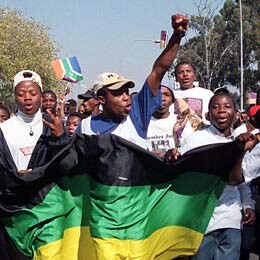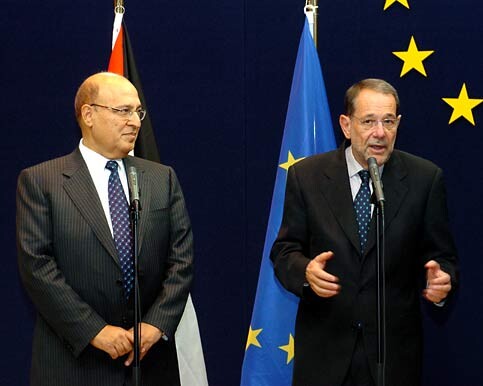The Electronic Intifada 28 February 2005

The past four years of the Intifada have been a very painful period for the Palestinians, but a positive effect has been that international public opinion has once again been focused on the conflict. The seven years between the two Intifadas resulted in a near total silence in the Western press and a near total disappearance of the conflict from the international political agenda. During these years Israel could extend its occupation without any protest or pressure from the Western world.
But the brutal measures of the Israeli government during the Second Intifada and especially the television images of the suffering of the Palestinians led to a change in the European perceptions of the conflict. Last year, an opinion poll commissioned by the European Union (EU) in 15 European countries ranked Israel as the greatest threat to peace in the world with 59 percent of the targeted sample. In the Netherlands, which has always been a pro-Israel country, 74 per cent of the public put Israel on the top of the list of warmongers.
This change in the European public opinion is primarily based on emotion and not on factual information. Also, during the four years of the Intifada the Palestinians have not convincingly communicated their case to the world. When the fighting stops and the images of Palestinian suffering disappears from the television screens, public opinion will move to other disaster areas in the world and the Palestinians will be forgotten. It is therefore essential, for the Palestinian cause, to launch a media offensive in Europe.
The struggle of the Palestinian people is often compared with the anti-apartheid struggle in South Africa. There are indeed many similarities, but there are also important differences. The case of South Africa has shown that organized public opinion in the West can have an impact on politics. South Africa was liberated by a combination of armed resistance, public pressure by the black population and international public condemnation, which forced the Western governments and industry to put pressure on the white South African government. The African National Congress (ANC) succeeded in mobilising even conservatives in Europe and America.
But to build up a strong solidarity movement in the West is a long process. In the case of South Africa it took more than 30 years.
The resistance movement of South Africa started at an early stage. In those days the ANC depended for a large part on the $300,000 a year that was donated by the Soviet Union. It was a very poor movement compared with the Palestine Liberation Organisation (PLO), which received $300 million from the Arab oil states, one thousand times as much. But the PLO has never seriously attempted to rally the Western world to the Palestinian cause. The PLO had not only more than enough money, but it also had at its disposal enough good activists who had lived in the West and who knew how to mobilise Western public opinion.
In the case of Palestine, international public opinion and a strong solidarity movement are even more important than in the case of apartheid South Africa. South Africa lies in a far corner of the world and had little strategic interests for the Western governments, while the Middle East is nowadays at the center of world politics. Moreover, Israel is dependent on economic support from the USA and Europe. As it has few natural resources, Israel can only survive, with its high living standard and the costs of war and occupation, through the enormous American subsidies and the favourable trade arrangement with the European Union. South Africa on the other hand was rich in minerals and could survive without outside economic support.
Of course it will not be easy to mount a persuasive educational campaign in favor of Palestine. The Israeli lobby in the West is strong and most journalists reporting on the conflict live in Israel. The Nazi persecution of Jews left the Europeans with a guilty conscience and fear of being accused of anti-Semitism. Moreover, there are Western prejudices towards the Islamic and Arab worlds.
But in the days of strong anti-communism it was also not easy for the ANC to increase solidarity for a liberation movement that had very close ties with the Soviet Union. And the black liberation movement had also to overcome white racism and the ties of blood between the white populations of Europe and South Africa.
Compared to the United States, the European Union has — at least in words — a good position, as its stated aim is to end the conflict on the basis of international law and United Nations (UN) resolutions. It recognizes Israel within the borders of 1967. In June 2002, the EU declared for the first time that the occupation must end and that a viable Palestinian state must be established “on the basis of the 1967 borders, and if required, with minor adjustments”. More recently, in October 2004, the EU foreign policy coordinator Javier Solana declared in an interview with Der Spiegel that evacuating Gaza Strip settlements and four of the West Bank ones would not suffice, calling Israel to pull out of all of the West Bank and Gaza Strip.

Javier Solana (R) meeting with the Minister of Foreign Affairs of the Palestinian Authority, Mr. Nabil Sha’ath, 22 October 2004. (Photo: The Council of the European Union)
What is lacking until now is the will of the EU to put these words into practice. For instance, under the EU-Israel Association Agreement, free access to Israeli exports to the EU is conditional upon “respect for human rights” by Israel, which forms an “essential element” in the agreement. The threat of suspending the agreement can be a useful tool for the EU to force Israel to accept a Palestinian state in accordance with the UN resolutions. For the realization of the Palestinian legitimate national goals, a media offensive or propaganda war in Europe is therefore essential.
It is encouraging that last year a confidential Israeli report prepared by the Israeli Foreign Ministry’s Centre for Political Research warned of the Jewish state becoming a “pariah state” like apartheid-era South Africa. If the Israeli-Palestinian conflict is not resolved, in the next decade Israel and Europe will find themselves on a collision course that will gravely harm Israel politically and economically. The report says that “such a collision course holds the risk of Israel losing international legitimacy and could lead to its isolation, in the manner of South Africa”.
It will be up to the Palestinian NGOs and individuals to take a leading role and be the gatekeepers of the process, and in times of negotiation the Palestinian authorities will have to carefully balance their words.
The solidarity movement in the West needs guidance from non-sectarian voices of the oppressed people. There are hundreds of Palestinian NGOs financed from within Europe, but how many have a clear opinion about starting a boycott of Israeli products in Europe, or only of products from the occupied territories? Or should a campaign be started to force the British-Dutch Unilever and other multinationals to withdraw their factories from the occupied territories?
Palestinian opinion leaders in cooperation with the European solidarity movements need to generate more opinion articles in the European press. When the negotiations start there will be many opportunities to explain the Palestinian demands in the European press. Each time that a visit of Sharon or Peres to a Western country is announced there is an opportunity to write such articles. Of course, it is on a par with, in war, shooting ten times with only one hit. But the same article can be used for more papers in different countries. In July last year, when the Netherlands occupied the presidency of the European Union for half a year, many articles from all corners of the world appeared on the opinion pages of the Dutch newspapers, but not from Palestine. As the EU presidency moves twice a year to another country there will soon be new opportunities.

Reuven Paz
On 30 May 2004, Hamas declared its “severe condemnation and sorrow for the criminal (Al Qaeda) attack that occurred…in the brother kingdom of Saudi Arabia.”
There are also some useful lessons to be learnt from the former apartheid leaders including F W De Klerk and Roelf Meyer. They are proud of the way in which they were able to find a peaceful end to the South African conflict and have at different occasions offered some golden rules for the Israeli-Palestinian negotiations.
F W De Klerk has said, “The most important lesson that Israel can learn from South Africa is that, in bringing an end to a violent conflict, you cannot choose your interlocutor. For a long time in South Africa, my predecessors and my party tried to pick those among the black African leaders with whom to negotiate. We made the mistake of negotiating with very good people, but who could not bring the majority of blacks into a negotiated agreement. In the end the negotiations ultimately succeeded because we negotiated with those who had the capacity to mobilise the majority of black South Africans to accept the agreements. Agreements that successfully end violent conflicts must be between those who can deliver their constituency and bind them into such agreements.”
De Klerk has also said that, “When you wait with the negotiations until the last shot is fired you give a veto-right on the negotiations to your most extreme opponent. Although 10,000 South Africans were killed between 1991 and 1994, the negotiating process continued.”
Finally, consider also the words of Roelf Meyer: “It was not until the Apartheid government — the side with the power — gave up the dream of perpetuating white rule that the negotiations moved forward, and therefore it is up to Israel — the side with the power — to decide to end its occupation. As long as Israelis don’t accept Palestinians as equal partners in a new, win-win paradigm based on a viable Palestinian state alongside Israel, negotiations will be undermined by suspicion and manipulation. Like Mr De Klerk in 1990, Israeli Prime Minister Sharon knows that in face of new international realities and demographic pressures, the greater risk is to take no risk. And a strategy that discounts Palestinian needs and interests is likely to yield only limited success.”
Sietse Bosgra is a former anti-apartheid activist based in the Netherlands.


